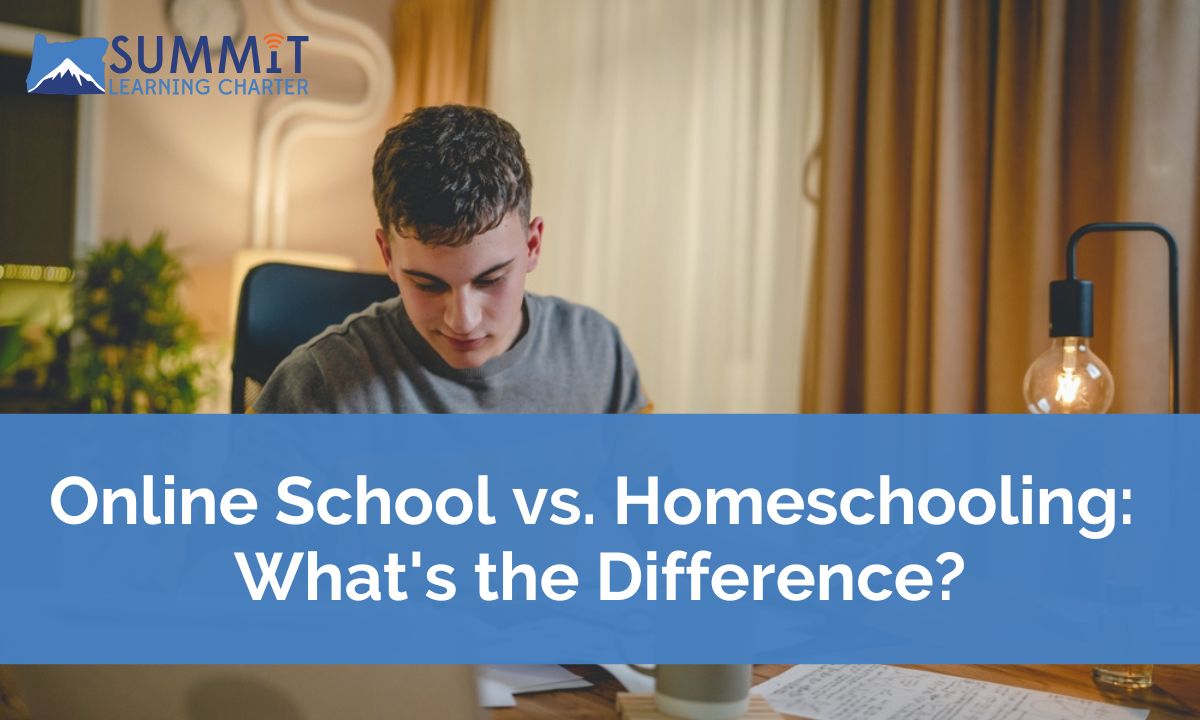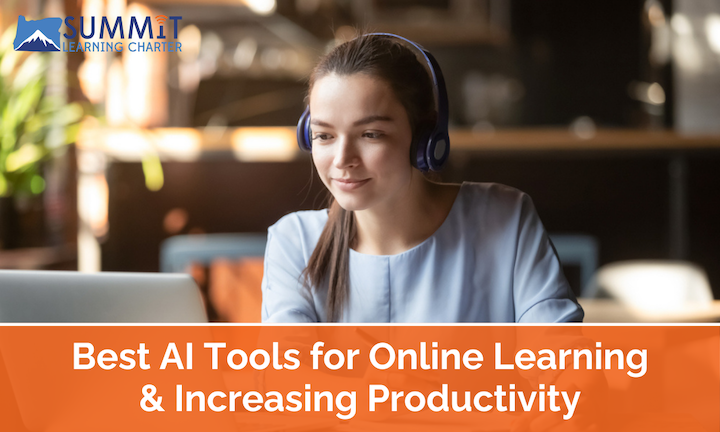
Online School vs. Homeschooling: What’s the Difference?
The line between traditional schooling and homeschooling used to be simple. Kids either went to a brick-and-mortar school and learned from teachers, or they learned at home under the instruction of their parents.
But with the rise of remote learning, something the pandemic expedited, that line has started to blur.
At first glance, online school and homeschooling look very similar: both happen at home and include support from parents. But when you look closer, there are some big differences in how each model works, especially around who’s doing the teaching, how curriculum is chosen, and what kind of support is available to families.
In this post, we’ll break it all down to help you decide what makes the most sense for your learner and your family. We’ll explore how each model works, highlight the pros and cons, and explain what you can expect when it comes to curriculum, parent roles, socialization, and more.
Differentiating Online School vs. Homeschooling
According to the National Center for Education Statistics (NCES), 3.4% of students were homeschooled in the 2022-2023 school year, while 1.8% of K-12 students were enrolled in full-time public or private virtual schools.
The NCES considers students homeschooled if they meet the following criteria:
- Their parents report that they are being educated at home instead of attending a public or private school.
- They are not enrolled in a public or private school for more than 24 hours per week.
- They are not being taught at home because of a temporary illness.
Since both online school and homeschooling take place at home, the key difference lies in enrollment. Students enrolled in a public or private school, whether in-person or virtual, are not considered homeschooled. That enrollment status is the clearest way to distinguish between the two models.
This is the biggest difference between online schooling and homeschooling, and is what influences a number of factors that impact students’ overall learning experience. Let’s take a quick look at the pros and cons of online school and homeschooling, and then further explore the different factors that separate both schooling models.
Related: 7 Myths About K-12 Online Schools
Pros and cons of online school
Pros:
- Students are taught by certified teachers
- Curriculum meets state standards
- Structured learning with built-in flexibility
- Access to academic support, advisors, and enrichment options
Cons:
- Less parental control over what’s taught
- Requires a reliable internet connection
- Some students may prefer more hands-on or offline learning
Pros and cons of homeschooling
Pros:
- Control over curriculum and teaching style
- Totally flexible schedule and pacing
- Ability to align learning with family values or educational philosophies
- Great for tailoring education to specific interests
Cons:
- Parents do all the lesson planning, teaching, and tracking
- No built-in teacher or academic support
- Greater administrative responsibility (record-keeping, compliance)
- May lack access to extracurriculars and peer interaction
- Can be time-intensive for parents, especially with multiple children
Both online school and homeschooling are more flexible options that allow students to learn at home, but they differ in who leads the learning and how much structure is built in.
If you’re looking for a program with teacher support and a ready-made curriculum, online school may be the better fit. Meanwhile, homeschooling could be the better option if you want full control over your child’s education and schedule.
How is curriculum and assessment performed?
This is one of the biggest differences.
Since online school requires enrollment in a public or private institution, the curriculum is aligned with state standards. That means lesson planning, instruction, grading, and progress tracking are all managed by the school, and students follow a clear path toward graduation.
It also means participating in standardized national and state testing. As part of Oregon statewide assessments, for instance, students are assessed in English and math in grades 3, 8, and 11, and science in grades 5, 8, and 11.
On the other hand, homeschooling gives parents full control. You choose or design the homeschool curriculum and decide how to measure learning – it’s full control, but also full responsibility.
Neither approach is better or worse, it just depends on what you’re looking for.
If you prefer the support of a structured program and aren’t interested in selecting or creating your own curriculum, an online school, like Summit Learning Charter, is the way to go. But if you want the freedom to tailor every part of your child’s education, homeschooling gives you that level of flexibility.
What kind of diploma do students earn?
Another key difference is how graduation works.
As we mentioned above, students in online school have a clear path toward graduation. They receive official transcripts and a high school diploma after graduating. This makes for an easy transition to university, internships, or other post-secondary programs.
Homeschooled students receive a homeschool diploma, but since it’s not issued by an accredited school, colleges and employers may ask for additional documentation (like course descriptions, work samples, or SAT/ACT scores) to verify their academic experience.
The importance of online school accreditation can’t be overstated since it provides students with a recognized diploma, simplifies college applications, and signals academic credibility.
The Role of Parents in Online School vs. Homeschooling
Parents and/or guardians are essential for both online school and homeschooling, but the role they play in both can be quite different.
In online school, parents/guardians act as learning coaches.
They actively support students’ learning journey but don’t replace teachers. They’re encouraged to check in regularly, communicate with teachers, and help create a good study environment, but the heavy lifting on the academic side is done by the school. Certified teachers handle the instruction, grading, and academic support.

In homeschooling, parents take on the role of both the teacher and administrator.
They’re responsible for selecting or designing the curriculum, planning daily lessons, teaching every subject, tracking progress, and ensuring compliance with state laws. It’s a full-time commitment that offers maximum control and flexibility, but also requires significant time, planning, and confidence in leading the learning journey.
Homeschool and Online School Socialization & Support
One of the biggest questions families have when considering at-home learning is how their child will connect with others and what kind of support they can expect.
When assessing online school vs. homeschooling, keep in mind that both offer opportunities for connection and community, but they differ in how those opportunities are accessed.
Students who study in online schools are part of a larger learning community. At Summit Learning Charter, we offer ongoing support from teachers, advisors, and specialists. There are also plenty of chances to connect with peers, both online and in person. We host enrichment opportunities, field trips, clubs, and other extracurricular activities. This kind of online school socialization is a key benefit for families who want the flexibility of home learning without sacrificing community.
Homeschooling families need to create their own social opportunities. Some homeschool parents connect with local homeschooling groups, organize field trips, or join online forums and co-ops. But building those connections takes time and effort, and may not always be consistent.
When it comes to support, online schools also offer an advantage. There’s a whole team ready to help with academics, tech, and student well-being. In homeschooling, parents often take on those roles themselves or need to find outside resources.
Which option is right for your family?
Homeschool and online school both offer the flexibility benefits that many families are looking for, but they meet different needs.
If you want your child to learn from home without giving up structure, support, and accreditation, online public school is likely the best option. If you’re ready to design your child’s education from scratch and take on the role of both teacher and administrator, homeschooling offers a fully customized experience.
When it comes to online school, you can easily apply for the school year or transfer mid-year.
At Summit Learning Charter, a virtual charter school, we believe students do best when they have options. We recognize that each student is unique and learns differently, which is why we offer personalized learning for every stage of K-12 education.
Reach out today to learn more about learning online with Summit Learning Charter!




